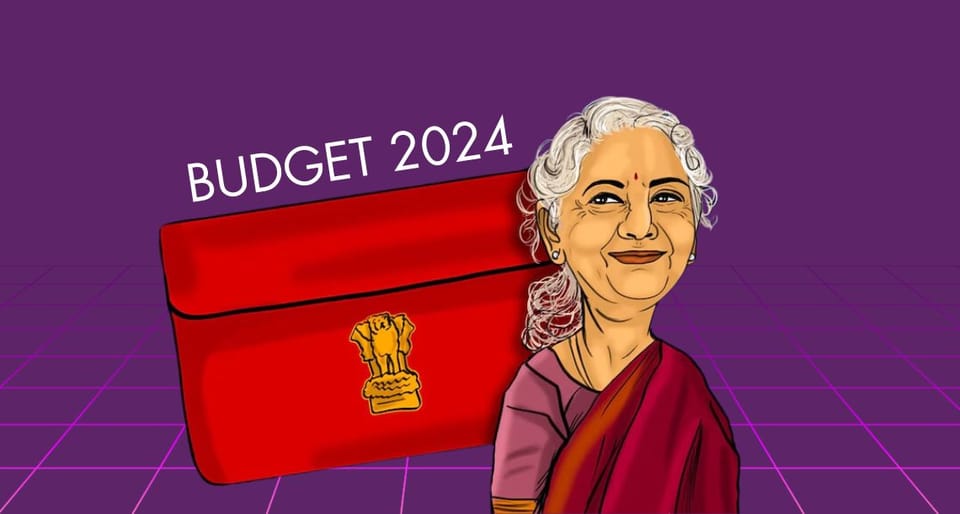Discover What's New in Budget 2024: Updates on Taxes and Investments

Updates on Taxes and Investments
The recent Union Budget for 2024 has brought about significant changes in how taxes are structured, particularly affecting capital gains and personal income tax. Let’s delve into these updates and what they mean for you:
New Income Tax Slabs Unveiled Under the latest tax regime, the government has introduced new income tax slabs to simplify taxation:
- No tax on income up to ₹3,00,000.
- 5% tax for income between ₹3,00,001 to ₹7,00,000.
- 10% tax for income between ₹7,00,001 to ₹10,00,000.
- 15% tax for income between ₹10,00,001 to ₹12,00,000.
- 20% tax for income between ₹12,00,001 to ₹15,00,000.
- 30% tax for income above ₹15,00,000.
Additionally, The government has also raised the standard deduction under the new tax regime to Rs 75,000 from Rs 50,000.
Note: It's always wise to consult with a tax advisor for personalised advice on your tax situation.
Here’s how the tax changes in the 2024 Budget could impact your investments:
- Short-Term Capital Gains (STCG): The tax rate has increased from 15% to 20%. This 5% rise might discourage short-term trading activities.
- Long-Term Capital Gains (LTCG): The tax rate on gains exceeding ₹1.25 lakh has been raised from 10% to 12.5%. Despite this slight increase, the exemption limit has also been raised to ₹1.25 lakh, offering some relief to investors.
- TDS on Repurchase by Mutual Fund or UTI: The previously applicable 20% TDS has been withdrawn. This change enhances liquidity and makes mutual fund investments more attractive.
- Standard Deduction (New Tax Regime): The standard deduction has been increased from ₹50,000 to ₹75,000. This move provides greater tax relief for salaried individuals and pensioners, thereby increasing disposable income.
- Securities Transaction Tax (STT): The STT rates on Futures have increased from 0.0125% to 0.02%, and on Options from 0.0625% to 0.10%. This reflects a higher cost for trading in these financial instruments.
These adjustments aim to balance tax revenues while potentially influencing investment decisions. It’s advisable to stay informed and consider consulting a tax advisor to navigate these changes effectively based on your financial goals and portfolio.
The tax adjustments introduced after the 2024 Budget will significantly affect investment strategies, especially concerning capital gains. It is crucial for investors to thoroughly assess their portfolios and adapt their investment strategies to capitalize on the advantages provided by the updated tax rules. Staying well-informed about these modifications and seeking advice from a tax advisor will enable investors to make informed decisions aligned with their specific financial circumstances.
Frequently Asked Questions (FAQ)
1. What are the new income tax slabs introduced in Budget 2024?
The new income tax slabs are as follows:
- No tax on income up to ₹3,00,000.
- 5% tax for income between ₹3,00,001 to ₹7,00,000.
- 10% tax for income between ₹7,00,001 to ₹10,00,000.
- 15% tax for income between ₹10,00,001 to ₹12,00,000.
- 20% tax for income between ₹12,00,001 to ₹15,00,000.
- 30% tax for income above ₹15,00,000.
2. What changes have been made to the standard deduction under the new tax regime?
The standard deduction has been increased from ₹50,000 to ₹75,000.
3. How has the tax rate for short-term capital gains (STCG) changed?
The tax rate for STCG has increased from 15% to 20%.
4. What is the new tax rate for long-term capital gains (LTCG) exceeding ₹1.25 lakh?
The tax rate for LTCG exceeding ₹1.25 lakh has been raised from 10% to 12.5%.
5. Has the exemption limit for long-term capital gains been changed?
Yes, the exemption limit for long-term capital gains has been raised to ₹1.25 lakh.
6. What is the change in TDS on repurchase by mutual funds or UTI?
The previously applicable 20% TDS on repurchase by mutual funds or UTI has been withdrawn.
7. How have the Securities Transaction Tax (STT) rates changed?
The STT rates have increased as follows:
- Futures: From 0.0125% to 0.02%
- Options: From 0.0625% to 0.10%
8. How do these tax changes impact investors?
The changes may impact investment strategies, especially regarding capital gains. The increase in STCG and LTCG rates might affect trading activities, while the higher standard deduction provides more tax relief for salaried individuals and pensioners. The removal of TDS on mutual fund repurchases enhances liquidity, making these investments more attractive.
9. Should I consult a tax advisor regarding these changes?
Yes, it is advisable to consult a tax advisor to get personalized advice based on your specific financial situation and to navigate these changes effectively.
10. How can I stay informed about further updates and plan my investments accordingly?
To stay informed, regularly check for updates from reliable financial news sources, subscribe to newsletters, and consider seeking advice from financial and tax advisors. You can also plan your investments with professional help by clicking here.






Member discussion